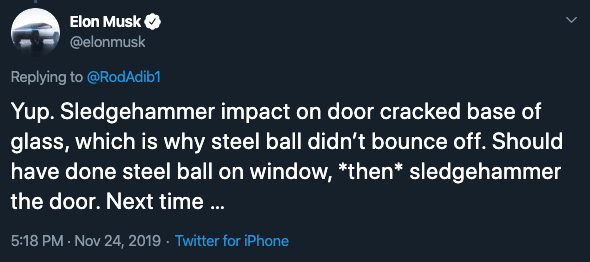Technology
After pounding the side of his new Cybertruck with a sledgehammer with not a mark left behind, Elon Musk turned his focus to the &Tesla Armor Glass&.
As we all saw, the glass did not fare so well. A toss of a steel ball into the window caused it to splinter, catching everyone on stage off guard. &Oh my [bleeping] God,& said Musk.
A repeat attempt on the rear window had the same results, leaving the truck with cracks awkwardly sprawled across its glass for the remainder of the presentation.
In hindsight, Elon says they probably should&ve done the window demo before they smacked the truck with a big ol& hammer.
Elon tweets:

Would the window have cracked regardless of order? At least on stage, they only pounded on the front door panel; were these hits enough to crack the base of the glass on the rear door, too? Itprobably impossible for anyone outside of Tesla to say with certainty, but that seems pretty wild.
The night after the announcement, Elon tweeted out a video of their tests &right before launch&, in which the window seemingly had no problems:
Some commenters postulated (assuming that the truck in the video was the same one on stage) that these earlier tests could&ve primed the window for failure — that the test hits weakened the glass, even if they didn&t visibly damage them.
Whatever the cause, the glass cracked — twice. The (literal) damage is done. But while the broken windows have become something of a meme, itnot as if the failed demo wiped out interest; Musk says that, as of Sunday night, over 200,000 people had put down refundable $100 deposits (so over $20M in deposits in all) on the truck. And with the Cybertruck not expected to go into production until late 2021, I&d be surprised if Tesla doesn&t make some tweaks and find some over-the-top way to demonstrate V2 of the truckglass before these things actually start rolling out.
- Details
- Category: Technology
Read more: Elon Musk says sledgehammering Cybertruck led to the onstage window failure
Write comment (93 Comments)
Over the years, Trinity Ventures has racked up many exits for its limited partners.
Through deals in consumer brands like Starbucks and Zulily and enterprise companies like TubeMogul and New Relic, the Menlo Park-based fund has found repeated success, but as it retrenches with a pared-down investment team and a much smaller new fund, Trinityinvestors have some thoughts about what lies ahead for the venture capital community.
As the firmpartners consider whatin store for 2020, they emphasize that entrepreneurs will have to focus on public policy; blockchain will experience a renaissance; a recession is coming and the accessibility of data and an aging global population will continue to reshape healthcare markets.
The firm is currently in the process of closing what would be its smallest fund in years, a $250 million investment vehicle, first disclosed in a filing with the Securities and Exchange Commission in July. That fund, as first reported by Crunchbase News, is the firmmost modest vehicle in nearly 20 years; the last time Trinity raised less than $300 million was in 1998.
Even as it invests from a smaller vehicle, the team is still putting capital to work in deals like the human resources-focused technology startup, Cultivate; the interbank payment company, Baton;Squire, a payment and booking management platform for barbershops and salons, and Valtix, an enterprise security company.
For Patricia Nakache, an investor in companies like Turo, Care.com, and ThredUp, understanding regulation and public policy will have to become part of the job for budding entrepreneurs and big companies alike.
- Details
- Category: Technology
Read more: What the partnership at Trinity Ventures sees for the road ahead in 2020
Write comment (98 Comments)
Amazon announced a new capability today called Amazon Rekognition Custom Labels to help customers train machine learning models to understand a set of objects when there is a limited set of information.
Typically, machine learning models have to work on large data sets to learn something like whata picture of a dog, as opposed to some other animals. Amazon Rekognition Custom Labels can work with a limited data set to teach the algorithm a group of objects specific to a given use case.
&Instead of having to train a model from scratch, which requires specialized machine learning expertise and millions of high-quality labeled images, customers can now use Amazon Rekognition Custom Labels to achieve state-of-the-art performance for their unique image analysis needs,& the company wrote in a blog post announcing the new feature.
For example, you may want to teach the model to identify a set of engine parts, a limited set of information, which has a lot of meaning to a specific use case. Less information like this actually poses a problem for most machine learning models, but this feature has been designed specifically to learn from a smaller amount of data. Instead of hundreds or thousands of images, Amazon Rekognition Custom Labels can work with as few as ten images to learn to identify the object.
Amazon has gotten flack from the ACLU and shareholders in the past for selling Amazon Rekognition to law enforcement to help identify faces. This feature offers a more benign use of similar technology.
The new feature goes live next week on December 3rd, right in time for AWS re:Invent, the companycustomer conference taking place in Las Vegas.
- Details
- Category: Technology
Read more: New Amazon tool helps machine learning models identify unique objects
Write comment (97 Comments)CBS over-the-top streaming service, CBS All Access, is the latest to counter the threat from Disney+ by investing in childrenprogramming. Today, the company is launching a kids& programming lineup including original shows and other library content. Plus, in one of the first major content integrations ahead of the ViacomCBS merger, the CBS streaming service will soon add a selection of Nickelodeon childrenTV shows to its catalog.
The first Nickelodeon titles will roll out in January, the company says.
In August, CBS had announced plans to launch childrenprogramming on its service by way of deals with WildBrain (formerly DHX Media) and Boat Rocker Studios. From WildBrain, CBS licensed the kids& TV series &Cloudy with a Chance of Meatballs,& produced with Sony Pictures Animation. And from Boat Rocker, CBS licensed the new &Danger Mouse,& produced with BBC ChildrenProductions.
The two shows are the first original childrenseries on the service, which today is better known for its original programming aimed at adults, like &Star Trek: Discovery,& &The Good Fight,& &The Twilight Zone,& and soon &Star Trek: Picard.&
Today, the two originals are now live for subscribers alongside a library of kids& content that includes &Bob the Builder,& &Inspector Gadget,& &Madeline,& &Heathcliff,& &The Adventures of Paddington Bear,& and the original &Danger Mouse.&
Over the next several weeks, CBS says it plans to grow its kids& library to over 1,000 episodes as more TV series are added.
&Bringing childrenprogramming to CBS All Access is a significant step toward providing even more value for our subscribers and now for their children as well,& said Marc DeBevoise, President and COO, CBS Interactive, in a statement. &We&re bringing to market a fantastic roster of exclusive originals along with a library of marquee series for families, and we look forward to continuing to expand our childrenprogramming offering, especially with the future addition of incredible programming from Nickelodeon.&
The company did not specify which titles from Nickelodeon would come to CBS All Access, but itpossible the lineup could include shows like &SpongeBob SquarePants& or &Dora the Explorer,& which went over to Amazon Prime Video after Viacom pulled them off Netflix back in 2013. Today, some of the early seasons of those shows and others are available as part of Amazon Primefree streaming perk, while later seasons can only be rented or purchased.
&Spongebob,& &Dora,& and other classic Nickelodeon kids& shows are not included in Nickelodeonnew agreement with Netflix, which is focused on new, original content using both well-known characters and all-new IP. According to The NYT, that deal was valued at $200 million.
It would make sense for CBS All Access to eventually absorb Viacom kids& streaming service Noggin, which is where you can today find &Dora,& along with other shows like &PAW Patrol,& &Peppa Pig, &Team Umizoomi,& &Wallykazam,& &Bubble Guppies,& &Rusty Rivets,& &BlueClues,& &Blaze,& &Shimmer - Shine,& &Max - Ruby,& &Wonder Pets,& &Nia Hao, Kai-Lan,& and several others. This would round out CBS All Access as a more family-friendly streaming service with a wide catalog, which would help it to better compete with Netflix, Hulu and of course, Disney+.
As a combined entity, it doesn&t make sense for ViacomCBS to ask its customer base to subscribe to both services or choose between them. And Noggin, in particular, doesn&t make sense given the higher churn rate for a service which only appeals to families with younger kids — who age out of the service after a few years. It would be better to put these shows in front of the larger CBS All Access audience, helping it to tout a larger catalog in marketing materials and attract a wider group of cord-cutting consumers.
- Details
- Category: Technology
Read more: CBS All Access launches kids’ programming, soon to include Nickelodeon shows
Write comment (93 Comments)Apple has released its annual holiday ad, just in time for Thanksgiving. Named &The Surprise,& the ad focuses on two young girls who spend a lot of time playing with an iPad.
The ad focuses on a family that travels across the country to visit the motherfather. Like many families, the parents hand them an iPad when their daughters start to fight…
When they arrive at the grandfatherhouse, we realize that the grandfatherwife recently passed away. Both the grandfather and the mother are still mourning.
While their parents tell the kids to watch something on the iPad, they end up using the iPad to build a touching slideshow using old family photos.
- Details
- Category: Technology
Read more: Apple releases holiday ad
Write comment (92 Comments)
In other news, Deadpool actor Ryan Reynolds has invested an undisclosed amount in a company selling prepaid phone plans called Mint Mobile.
It all sounds like a weird sponsored Instagram post, but a source tells TechCrunch that Reynolds now owns more than 25% of the company with this recent investment. What he invested is thoroughly unclear and a Mint Mobile spokesperson did not comment on the companyvaluation.
Mint Mobile is a mobile virtual network operator, meaning the company does not actually own the network infrastructure it operates on. It uses T-Mobilecellular infrastructure. The MVNO launchedbeneath Costa Mesa, California-based Ultra Mobile in 2016 and the brand was only recently incorporated as its own entity. Ultra Mobile CEO David Glickman is also the CEO of Mint Mobile.
MVNOs are vehicles to create a new carrier brand without having to worry about most structural barriers of entry. As the T-Mobile and Sprint deal wraps up and T-Mobilescrappy &uncarrier& marketing slows down, there may be more attention being paid to these smaller MVNO entities.
Ultra Mobile has carved out a niche focusing largely on prepaid plans for low-income immigrants in the United States. The companyonline-only Mint Mobile brand seems to have been an effort for the company to bring a younger demographic onto its service. The company sells 3, 6 and 12-month prepaid blocks of wireless service, their cheapest regular-priced option being a $15 per month plan (billed annually).
Bringing Reynolds onboard certainly seems to be an effort to bring a star with a substantial social media following into the fold.Celebrity deals where recognizable names put up some cash and supply a big PR boost for the startup are far from rare. Andreessen Horowitz has built an entire fund around getting celebrities into startup deals. Retired NFL running back Marshawn Lynch is the public face of Beast Mobile, another MVNO.
&Celebrities generally invest in high-end products like skincare brands or delicious gin companies,& Reynolds said in a press release. &Yet Mint is making wireless way more affordable at a time when the average American is paying 65 dollars a month.& Reynolds is also an owner of Aviation Gin.
Disclosure: TechCrunch is owned by Verizon Wireless.
- Details
- Category: Technology
Read more: In wake of Sprint/T-Mobile deal, Ryan Reynolds has an announcement
Write comment (90 Comments)Page 262 of 5614

 11
11